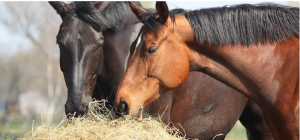 Preserving Horse Health in the Face of Low-Quality Forage: Horse owners often don’t have control over the hay given to their horses. Because of this, they regularly offer a concentrate or ration balancer. This provides the requisite nutrients low or missing in the forage. However, well-formulated products can fill this dietary void. Yet, researchers wondered if additional fortification would increase digestion and bolster muscle accretion over the topline.
Preserving Horse Health in the Face of Low-Quality Forage: Horse owners often don’t have control over the hay given to their horses. Because of this, they regularly offer a concentrate or ration balancer. This provides the requisite nutrients low or missing in the forage. However, well-formulated products can fill this dietary void. Yet, researchers wondered if additional fortification would increase digestion and bolster muscle accretion over the topline.
In the 56-day study, stock-type horses were offered a base diet of low-quality hay. They supplemented with first a pelleted concentrate balanced to National Research Council requirements. Second, the same pellet that had been fortified with additional amino acids. In addition, chelated trace minerals, and fermentation metabolite additives. (Which are prebiotics that support the fermentative flora of the hindgut.)
“The goal of offering concentrates was to provide a layer of nutritional protection to maintain or improve the health and performance of mature horses in the face of poor-quality hay,” Kathleen Crandell, Ph.D., a Kentucky Equine Research nutritionist advised.
The Study:
At the end of the two-month study, all horses had similar estimates of body fat. Regardless of the concentrate offered to them. The primary difference between the diets involved greater muscle development along the topline of those horses fed supplemental amino acids.
“These results suggest that horses may benefit from extra amino acid. (The building blocks of protein.) To compensate for lack of quality protein in the nutrient-poor hay,” Crandell summarized.
Kentucky Equine Research works with a global network of feed manufacturers dedicated to producing high-quality feeds. These manufacturers offer a full range of fully fortified concentrate feeds to meet the needs of horses and ponies during any stage of life.
“A ration balancer contains protein, macrominerals, microminerals, and vitamins, an ideal combination for balancing out the protein and other nutrients that may be missing in a lower quality hay without adding a lot of calories,” Crandell said.
Ration balancers can be fed as the sole concentrate for horses that have no problem maintaining weight on a forage-only diet. Combine with a straight grain (such as oats) as well. In addition to a fortified concentrate fed below the recommended rate.
“Offer ration balancers at a rate of 1-2 lb (0.45-0.9 kg) per day. It’s a much higher volume than only 1-4 oz (25-110 g) per day of a regular vitamin and mineral supplement. A true ration balancer will contain protein. Which is required if horses only have access to protein-deficient, low-quality forage,” explained Crandell.
When Evaluating Hay:
When evaluating hay, do not confuse low-quality hay with moldy or extremely dusty hay. Never offer them to horses. Low-quality hay will have negligible protein. As well as high indigestible fiber, and marginal vitamin content, yet still be clean and free of weeds, excessive dust, and other undesirable material. Poor-quality hay, on the other hand, as these same attributes. They can also be contaminated with mold or mycotoxins.
J & J Hay can help to answer horse-health and hay related questions.
Source: Kentucky Equine Research
